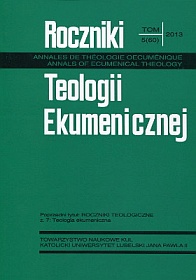The Issue of Women’s Deprivation in Light of the Social Commitment of the World Council of Churches
Abstract
The issue of gender justice increasingly shifts on to the core commitments of the World Council of Churches (WCC). Matters related to gender appear in a number of statements, commissions, programs and documents held within various bodies of the WCC. The survey of these commitments seems to be difficult to make, due to their diversity reflecting geographical, ethnic, economic and cultural background. This is partly affected by a nature of the WCC as it is the global platform where ideas from whole world are discovered, interpreted and passed on to the world. Article deals with the issue of gender justice and its place in the social discourse of the World Council of Churches.
References
de Beauvoir Simone. „The Second Sex: Introduction.” In Feminist Theory Reader. Local and Global Perpectives, edited by Carole R. McCann, Kim Seung-kyung, 40-48. New York: Taylor and Francis, 2013.
Elliott Anthony. Concepts of the Self. Cambridge: Polity Press, 2005.
Eichler Ulrike and Ilse Müllner (ed.). Sexuelle Gewalt gegen Mädchen und Frauen als Thema der feministischen Theologie. Gütersloh: C. Kaiser, 1999.
Gewalt gegen Frauen als Thema der Kirche 2000. Evangelische Kirche in Deutschland-Texte, Heft 71. Gütersloh: Gütersloher Verlagshaus, 2002.
Karski Karol. “Rola Światowej Rady Kościołów w ruchu ekumenicznym.” Roczniki Teologii Ekumenicznej 2(57) (2010).
Parry Sue. Beacons of Hope. HIV Competent Churches. A Framework for Action. Geneve: World Council of Churches, 2008.
Visser ’t Hooft Willem Adolph. The Genesis and Formation of the World Council of Churches. Geneve: World Council of Churches, 1982.
Winter Ralph D. The Unfolding Drama of the Christian Movement. Pasadena: William Carey Library, 2011.
World Missionary Conference 1910. Report of Commission VIII: Cooperation and the Promotion of Unity. Edinburgh, London: Oliphant, Anderson, Ferrier, 1910.

